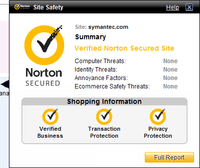Norton Safe Web
|
| |
 Norton Safe Web Dialogue | |
| Developer(s) | Symantec Corporation |
|---|---|
| Operating system | Microsoft Windows |
| License | Proprietary |
| Website | safeweb.norton.com |
Norton Safe Web (sometimes abbreviated NSW) is a service developed by Symantec Corporation that is designed to help users identify malicious websites. Safe Web delivers information about websites based on automated analysis and user feedback.
The software debuted as a public beta in 2008, and is now included in current versions of Norton Internet Security and Norton 360. A limited, standalone version of Safe Web, known as Safe Web Lite, is available as a freeware. Safe Web operates as a web browser plugin, and requires Internet Explorer 6 or Firefox 3 or later. The 2012 release of Safe Web Lite added Google Chrome support.[1]
Function

In addition to actively crawling and analyzing web sites, Norton Safe Web relies on feedback from users and Norton Community participants. When a drive-by download occurs at a web site, the suspicious URL is automatically reported to Norton Safe Web for analysis. The reported site is rated as unsafe if the analysis confirms that the download is malicious.
To ensure that its site rating accurately reflects the current state of a site, Norton Safe Web performs frequent re-analysis of Web sites. Norton Safe Web employs a site rating aging algorithm which estimates how often the safety of a particular Web site will change. Some of the factors used in this analysis include the site's rating history, the site's reputation and associations, the number and types of threats detected on the site, the number of submissions received from Norton clients, and site traffic. In other words, unsafe sites that are more likely to have been cleaned up are re-analyzed often while those that might take longer to remove detected threats are re-analyzed less frequently. User reviews are also accepted, with contributors ranked by reputation. Should a site owner dispute the ranking of their site, they can submit a request for re-evaluation after completing a validation process.[2]
Incorporation
Safe Web is installed alongside Norton Internet Security 2009 and Norton 360 version 3.0 as a browser toolbar. It color codes search results returned by Yahoo!, Google, and Bing Search using green, yellow, or red. Hovering over a pop-up summary will bring up a summary of the findings, and include a link to the full report of the site. Safe Web will also prompt or interrupt access to malicious sites users try to access directly via the address bar.[3]
Reception
Safe Web blocks phishing sites, overlapping in functionality with Norton Internet Security and Norton 360. Using Norton 360 v3, PC Magazine found discrepancies between Safe Web and Norton 360's built-in phishing protection. Symantec stated that phishing sites change rapidly, and one Norton service may be using older definitions than the other. Norton Safe Web has drawn some ire among Windows Live! Plus users as it shows that the Windows Live! Plus website contains malware.[4] Also Norton Safeweb blocks numerous sites with third party extensions such as mailgun and new relic. The verification of site ownership keeps failing so site owners can't fix the issue.
Norton Safe Web Lite
A free version of the software, Safe Web Lite, is available free of charge. The primary difference between the version of Safe Web bundled with Norton Internet Security and Norton 360 and Safe Web Lite is that Safe Web Lite does not block malicious websites. However Norton AntiVirus updates it with Norton SafeWeb Statics when Norton SafeWeb Lite is installed on your computer.
Green means safe. Yellow/Orange means caution. Red means warning.
See also
References
- ↑ Norton Safe Web Site "Norton Safe Web download", accessed May 19, 2011
- ↑ Rubenking, Neil J. "Norton Safe Web Searches Sites for Malware", PC Magazine, July 28, 2008, accessed July 15, 2009.
- ↑ Prince, Brian. "Symantec Unveils "Web Search Security Tool Beta", July 2, 2008, accessed July 21,2010
- ↑ Rubenking, Neil J. "Blocking Bad Web Sites", PC Magazine, March 13, 2009, accessed July 15, 2009.